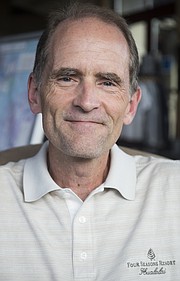County treasurer sees URD vote as unexpected win
To hear Steve Matheson speak of an advisory vote on urban renewal districts, one might think he came away with a victory.
“I’m pleased with the results,” the Kootenai County treasurer said. “It’s not what I expected, but I’m happy we had the vote.”
Matheson led the charge this year to push back against URDs, the mechanism that allocates taxes in certain areas of a town in an effort to promote private development and revitalize a neighborhood. In statements made prior to the May 19 vote, he said he’s seen too many concerned citizens and not enough accountability.
“When I have taxpayers come in and complain that their taxes are going up, it becomes weary,” Matheson said in February.
At the time, Coeur d’Alene’s most recent URD to launch — the Health Corridor, which aims to revitalize the area around Kootenai Health — was too late to bring to the people for a binding vote, as it had already been approved by city council. So Matheson and others then targeted the option of an advisory vote for the May 19 election, which would ask voters a more generalized question: “Do you support the use of Urban Renewal Districts (URDs) in Kootenai County?”
Matheson said he expected a different response from the county, which answered with a strong “Yes”: 18,221 ‘yes’ votes or 57 percent of the vote to 13,585 ‘no’ votes, 42.7 percent.
“Hopefully, going forward, we’ll be more willing to go to the people and listen to what they have to say,” he said. “I’m happy my voice was heard. I accept the results, and I’m more positive about urban renewal districts now than I ever was before.”
What weight do those results carry? Technically, nothing: An advisory vote is non-binding, generating no legislation or plan for the future. But advisory votes are meant to hold elected decision-makers politically accountable, giving both leaders and their challengers a reference point to cite when policy holds to the wishes of the people and when it strays from the pack.
Tony Berns — executive director of ignite cda, Coeur d’Alene’s urban renewal agency — said the over-whelming majority who voted ‘yes’ to URDs only solidified what ignite has already known.
“We have felt for years that the community supports the efforts of ignite cda and other urban renewal agencies across the country,” he said.
That support includes not only the Health Corridor but the Atlas Waterfront Park project, one in a series of moves to develop the Atlas Mill site.
“The Atlas Waterfront Park project should be complete next month,” Berns said.
It will include public space and restrooms, new waterfront access, new walking and biking trails, a new beach area, a new dog water park and a new parking area to provide access to those amenities.
Despite several venues for people to voice concerns and input — including public hearings, workshops, design sessions and feedback periods — an infrequent but still noteworthy complaint comes from some community members who say they have not participated in the process.
Berns said ignite’s outreach efforts have been broad in nature over the years. He said those examples, coupled with live broadcasting of its monthly board meetings and its website’s content, are intended to engage the community in its efforts.
As those efforts blossom along the Atlas Mill site, they are just beginning to bud near the Health Corridor. Ignite cda has partnered with the city, the Idaho Transportation Department, Kootenai Health and the Kootenai Metropolitan Planning Organization to hire a consulting firm to perform a traffic study for the Health Corridor area. Fixing traffic around Kootenai Health was one of the concerns driving change in the area around the hospital. It’s a change Kootenai Health CEO Jon Ness said couldn’t have happened without URDs.
“Our community has the benefit of seeing several successful urban renewal projects throughout Coeur d’Alene,” Ness told The Press. “As a community-owned hospital and large employer, Kootenai Health is fortunate to be part of the Health Corridor project, which Coeur d’Alene City Council already approved after 2½ years of studies and numerous public hearings. We look forward to creating better access to care and services for patients.”
Matheson, meanwhile, sees Tuesday’s vote as a win because, ultimately, the people had a say.
“I continue to hold my opinion that the use of urban renewal is not always used in a way I would like to see it used,” he said. “I would imagine the conversation will continue, and I hope the community will get to continue to have its voices heard.”



